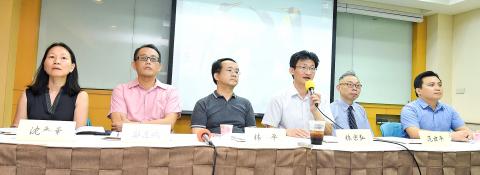With the Chinese government’s new residency card system taking effect on Sunday, Taiwanese students and teachers in China might be forced to apply for the cards if they wanted to access the so-called “31 incentives” offered to Taiwanese, National Tsing Hua University professor Lin Thung-hung (林宗弘) said at a seminar in Hsinchu yesterday.
The card would greatly reduce the “gray area” afforded Taiwanese by the “Taiwan compatriot travel documents” (台胞證) — permits issued to Taiwanese by Chinese authorities for travel to China — and Taiwanese would find it more difficult to avoid its political implications, said Lin, director of the university’s Center for Contemporary China.
The card does not offer anything that the compatriot pass does not, other than facilitating purchases of plane or railway tickets and other items online, he said.

Photo: Liu Hsin-de, Taipei Times
The card could also become a requisite for chartering planes back to Taiwan, allowing the Chinese government to further push its “united front” rhetoric, Lin said.
Other promised benefits, such as land purchases or rent discounts, have failed to materialize, he said.
While offering no concrete advantages, the card might require Taiwanese businesspeople to pay taxes to the Chinese government, Cross-Strait Policy Association secretary-general Wang Zhin-sheng (王智盛) said.
The Mainland Affairs Council should, in the interest of national security, establish a system that would register Taiwanese who hold Chinese residency cards, he said.
Students, teachers and other professionals are more likely to be affected by the new system, Wang said.
China has suffered a brain drain in the academia, because of a system that is heavily reliant on connections to the Chinese Communist Party, which severely restricts freedom of speech and research, he said.
That is why China is recruiting students in the region, he added.
In 2106 alone, China had 545,000 students studying abroad, but only 440,000 foreign students, including 66,000 from South Korea, 20,000 from the US, 15,000 from Japan and 11,000 from Taiwan.
Foreign companies might pull out of China because of the escalating trade war with the US, which would reduce job opportunities for Taiwanese in China, National Tsing Hua University professor Cheng Chih-peng (鄭志鵬) said.
Cheng called on students to consider their options and avoid the fate of Taiwanese businesses, whose profits are “shackled” to China.

Taiwanese can file complaints with the Tourism Administration to report travel agencies if their activities caused termination of a person’s citizenship, Mainland Affairs Council Minister Chiu Chui-cheng (邱垂正) said yesterday, after a podcaster highlighted a case in which a person’s citizenship was canceled for receiving a single-use Chinese passport to enter Russia. The council is aware of incidents in which people who signed up through Chinese travel agencies for tours of Russia were told they could obtain Russian visas and fast-track border clearance, Chiu told reporters on the sidelines of an event in Taipei. However, the travel agencies actually applied

Japanese footwear brand Onitsuka Tiger today issued a public apology and said it has suspended an employee amid allegations that the staff member discriminated against a Vietnamese customer at its Taipei 101 store. Posting on the social media platform Threads yesterday, a user said that an employee at the store said that “those shoes are very expensive” when her friend, who is a migrant worker from Vietnam, asked for assistance. The employee then ignored her until she asked again, to which she replied: "We don't have a size 37." The post had amassed nearly 26,000 likes and 916 comments as of this

New measures aimed at making Taiwan more attractive to foreign professionals came into effect this month, the National Development Council said yesterday. Among the changes, international students at Taiwanese universities would be able to work in Taiwan without a work permit in the two years after they graduate, explainer materials provided by the council said. In addition, foreign nationals who graduated from one of the world’s top 200 universities within the past five years can also apply for a two-year open work permit. Previously, those graduates would have needed to apply for a work permit using point-based criteria or have a Taiwanese company

US President Donald Trump said "it’s up to" Chinese President Xi Jinping (習近平) what China does on Taiwan, but that he would be "very unhappy" with a change in the "status quo," the New York Times said in an interview published yesterday. Xi "considers it to be a part of China, and that’s up to him what he’s going to be doing," Trump told the newspaper on Wednesday. "But I’ve expressed to him that I would be very unhappy if he did that, and I don’t think he’ll do that," he added. "I hope he doesn’t do that." Trump made the comments in